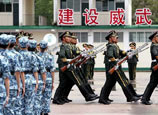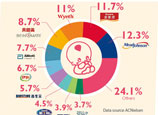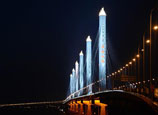
Singapore's central bank governor says the island state plans to widen its liquidity pool of the Chinese currency as part of extended efforts to turn itself into a major offshore yuan market.
Ravi Menon said the country is also developing hedging instruments as part of these efforts.
"The critical factors that will determine how well Singapore develops as an RMB hub are liquidity and a range of hedging products," said Menon, managing director of the Monetary Authority of Singapore, the central bank and financial regulatory authority.
Singapore holds 100 billion yuan ($16.3 billion) in renminbi deposits and Menon expects the total to rise.
"The deposits will grow at a stronger pace over time, facilitated by the launch of the Industrial and Commercial Bank of China's Singapore RMB clearing facilities in May.
"With more liquidity, financial institutions will offer a wider range of RMB products and services to better meet the financing, investment and risk management needs of the market," he told China Daily.
Hong Kong, the largest offshore RMB center, which accounts for 70 percent of overseas yuan deposits, had deposits of 698.5 billion yuan up to May, according to the Hong Kong Monetary Authority.
Taiwan is catching up quickly, and yuan deposits there might increase to 100 billion to 150 billion yuan by the end of the year from 66 billion yuan now, according to a report by Standard Chartered Bank.
Menon said offshore RMB liquidity in Singapore should be interchangeable with RMB liquidity in other offshore centers.
"This will help ensure that surplus liquidity in one center can be channeled to meet the demand in another, thereby improving the efficiency of the overall RMB market.
"While there will no doubt be some competition among the major offshore RMB clearing centers, such as Hong Kong, London and Singapore, they will also play complementary roles in developing the offshore RMB market."
These initiatives will reduce the likelihood of liquidity strains in the offshore market when expectations that the yuan will depreciate run high, he said.
The appointment of offshore RMB clearing banks in Taiwan and Singapore has reduced liquidity friction by enlarging the liquidity pipeline between the Chinese mainland and the offshore RMB market. The establishment of RMB liquidity facilities in Hong Kong and Singapore means that "backstop facilities" can be provided should liquidity strains occur.
Menon said the Monetary Authority of Singapore has broadened the scope to provide RMB liquidity for market stability and will soon be widening the types of collateral that will be accepted.
The Singapore Exchange is ready to quote, trade, clear and settle RMB-denominated securities, Menon said.
Last week, the Monetary Authority of Singapore allowed local banks to settle yuan trades at onshore exchange rates through the ICBC yuan clearing facilities in Singapore. Previously, trade settlement at the onshore rate was available only at branches of the Bank of China in Hong Kong or Taipei or their agent banks.
An executive at the Singapore branch of a State-owned Chinese bank said local banks are gradually moving their RMB clearing business back to Singapore from Hong Kong.
"More policy guidance is needed to encourage wider acceptance of the currency in Singapore. For instance, by allowing Chinese enterprises to use RMB assets as collateral when they make a tender," he said.
Beng Hong Lee, head of China FICC trading and structuring and product management for offshore RMB at Deutsche Bank, said: "Singapore is becoming an important RMB offshore market. You may see more direct trading of RMB assets soon."
According to data released by the Society for Worldwide Interbank Financial Telecommunication, Singapore is the largest "corridor" for use of RMB letters of credit after Hong Kong. In terms of RMB payment value, it is consistently among the top two offshore centers outside Hong Kong.
A letter of credit is a document issued by a financial institution, or a similar party, assuring payment to a seller of goods and/or services provided certain documents have been presented to the bank.
Menon said, "As use of the RMB expands over time in the region and beyond, there will be room for more than one offshore RMB center. Each center will have its own niche and strength."
He said Singapore's strength as an offshore RMB hub is its status as a regional trading hub and an international financial center.
In February, it joined Hong Kong, Taiwan and Macao in having a yuan clearing bank. One month later, it doubled the size of its currency-swap arrangement with China to 300 billion yuan.
In May, the Monetary Authority of Singapore opened its first representative office in Asia in Beijing — the third overseas after London and New York.
Within the first month of starting RMB clearing services in Singapore, HSBC, Standard Chartered Bank, DBS Bank and United Overseas Bank issued 2.5 billion yuan in offshore RMB bonds, or "Lion City Bonds".
Yuan clearing business in Singapore in the first month exceeded 60 billion yuan since ICBC began to offer the service on May 27.
"As regional corporations engage in RMB invoicing and fundraising activities, we expect to see stronger growth in RMB-denominated transactions, bond issuance and equity listings," Menon said.
"Offshore demand for RMB in Singapore is driven by cross-border trading and portfolio diversification needs rather than expectations of RMB appreciation.
"Ultimately, a stable and thriving Chinese economy is the best foundation on which to further the use of the RMB in this region and globally."
















 116-year-old Chinese woman recognized as world's oldest
116-year-old Chinese woman recognized as world's oldest


![]()
